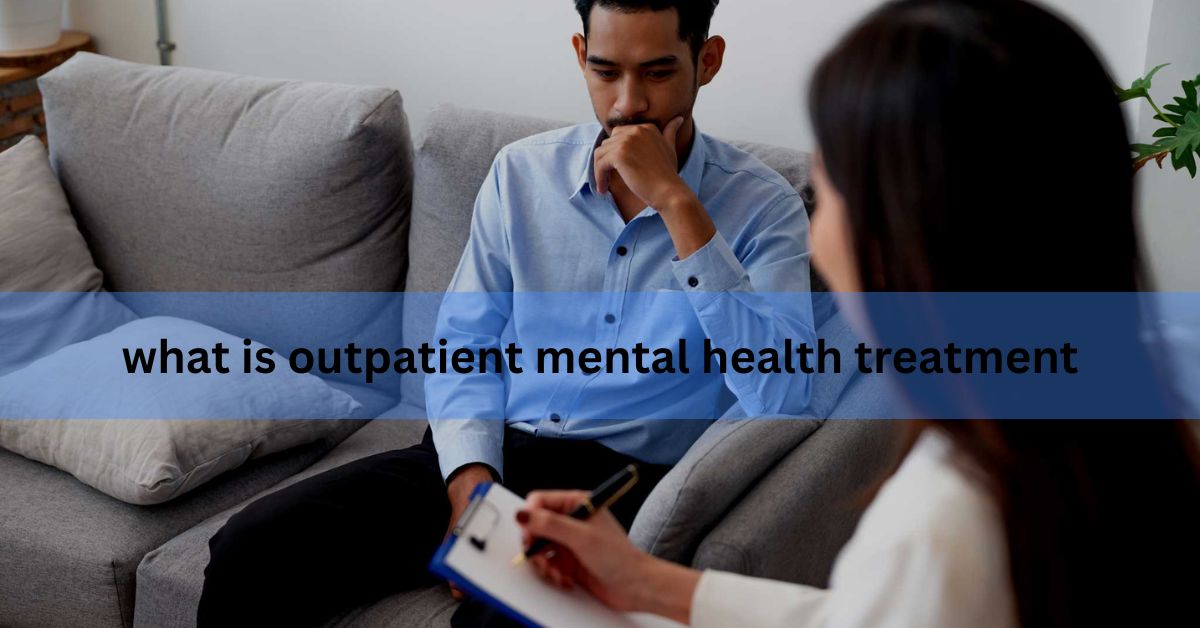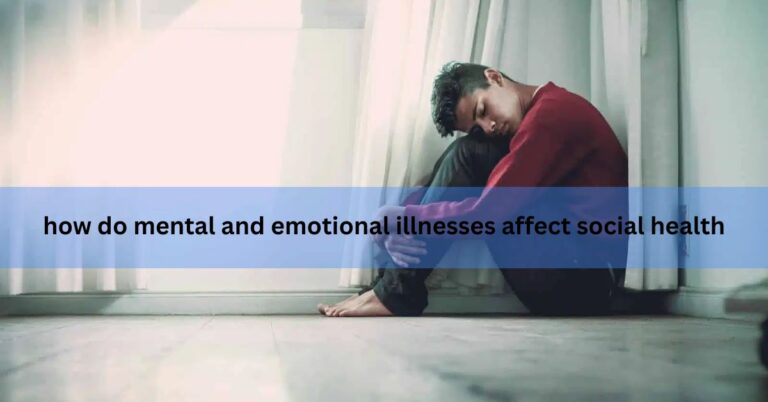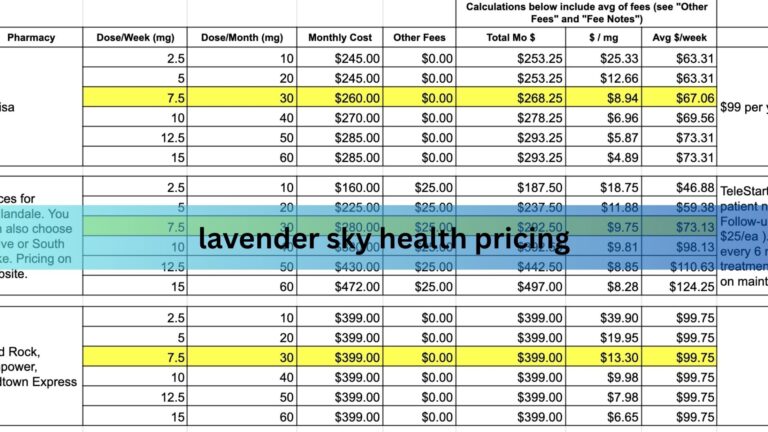What is Outpatient Mental Health Treatment – Improve Mental Wellness Now!
Mental health has become an increasingly important topic in today’s fast-paced world. Many individuals experience mental health challenges, and thankfully, modern healthcare offers a variety of treatment options. One of the most flexible and effective methods is outpatient mental health treatment. This form of care allows individuals to receive professional support while continuing to live at home, work, or attend school.
In this detailed guide, we’ll explore the various aspects of outpatient mental health treatment, how it works, who it helps, its benefits and challenges, and why it might be the right choice for you or your loved one.
Understanding Outpatient Mental Health Treatment:
Outpatient mental health treatment refers to therapy, counseling, and other mental health services provided without the need for an overnight stay at a hospital or residential facility. Patients attend scheduled sessions with professionals while maintaining their regular daily routines.
Key Characteristics of Outpatient Treatment:
- Scheduled appointments rather than 24/7 care
- Flexibility to live at home and continue work or school
- Various levels of care depending on individual needs
- Range of therapies including individual, group, and family sessions
- Collaboration with other healthcare providers for holistic care
Types of Outpatient Mental Health Treatment:

1. Individual Therapy
One-on-one sessions with a licensed therapist or counselor, focusing on:
- Cognitive Behavioral Therapy (CBT)
- Dialectical Behavior Therapy (DBT)
- Psychodynamic Therapy
- Solution-Focused Brief Therapy (SFBT)
2. Group Therapy
Facilitated by a therapist, group therapy brings together individuals facing similar challenges to share experiences and support each other.
3. Family Therapy
Involves family members to address interpersonal dynamics and improve communication, support, and understanding.
4. Intensive Outpatient Programs (IOPs)
More structured than regular outpatient care, IOPs offer:
- Multiple sessions per week
- Combination of therapy, education, and skill-building
- Close monitoring of progress
5. Partial Hospitalization Programs (PHPs)
A step between inpatient and outpatient care, PHPs provide:
- Daytime treatment with medical supervision
- Intensive therapy sessions
- Evening return to home environment
Who Can Benefit from Outpatient Mental Health Treatment?
Outpatient care can be effective for individuals experiencing:
- Depression
- Anxiety disorders
- PTSD
- Bipolar disorder
- Obsessive-compulsive disorder (OCD)
- Eating disorders
- Substance abuse issues (in some cases)
- Adjustment disorders
Benefits of Outpatient Mental Health Treatment:
Flexibility and Convenience
Outpatient treatment allows individuals to maintain work, school, and family commitments while receiving the care they need. This flexibility ensures that daily life is not significantly disrupted, allowing patients to balance treatment with personal responsibilities.
Cost-Effective
Outpatient care is typically less expensive than inpatient options. Many outpatient services are also covered by insurance plans, making it a more affordable option for long-term mental health support.
Also Read: What Are Home Health Aides Not Allowed To Do – Know Hha Job Limits!
Community and Support
Patients have access to peer support groups and can maintain strong connections with loved ones. This community involvement plays a crucial role in the recovery process and fosters a sense of belonging.
Privacy and Comfort
Receiving treatment while staying in a familiar environment helps patients feel more at ease. The comfort of being at home can reduce anxiety and make therapy more effective.
Personalized Care
Outpatient programs offer tailored treatment plans that address individual needs. Healthcare providers often collaborate with other professionals to create a comprehensive approach to care, ensuring that all aspects of a patient’s well-being are addressed.
Challenges and Limitations:
While outpatient treatment offers many advantages, it’s not suitable for everyone.
- Severity of Condition: Severe mental health crises may require inpatient stabilization.
- Commitment and Motivation: Requires active participation and accountability.
- Environment: Home life may not always be conducive to recovery.
- Access to Care: Limited availability of qualified providers in some areas.
How to Know if Outpatient Treatment is Right for You?
Consider outpatient treatment if you:
- Are medically stable
- Have a supportive home environment
- Are motivated to engage in treatment
- Do not require 24-hour supervision
Consulting a mental health professional can help determine the most appropriate level of care.
What Happens During Outpatient Mental Health Treatment?

Assessment and Evaluation
Comprehensive intake assessment, medical history and current symptoms review, and development of a personalized treatment plan are key components of this phase.
Therapy Sessions
Scheduled weekly or bi-weekly sessions are conducted to focus on symptom management, coping strategies, and long-term goals.
Medication Management
Psychiatric evaluation and prescription if necessary, followed by ongoing monitoring and adjustments.
Progress Monitoring
Regular check-ins to assess progress and make adjustments to the treatment plan as needed.
Support Services
This includes case management, educational workshops, and peer support groups that complement the therapeutic process.
The Role of Family and Friends:
- Emotional Support: Encouragement and understanding
- Practical Support: Assisting with appointments and daily needs
- Communication: Open dialogue about progress and challenges
- Education: Learning about the mental health condition to provide informed support
Outpatient vs. Inpatient Mental Health Treatment:
| Feature | Outpatient | Inpatient |
| Setting | At home | Hospital or residential facility |
| Supervision | Scheduled sessions | 24/7 care |
| Cost | Lower | Higher |
| Disruption to Daily Life | Minimal | Significant |
| Suitability | Mild to moderate cases | Severe or crisis situations |
How to Find Quality Outpatient Mental Health Services?
- Start with a Primary Care Provider: Get a referral to a mental health specialist.
- Insurance Provider Directory: Check covered providers within your network.
- Professional Associations: Use directories from organizations like APA or NAMI.
- Community Resources: Local clinics and non-profits often offer outpatient services.
- Online Therapy Platforms: Virtual outpatient services for added convenience.
Tips for Making the Most of Outpatient Treatment:
- Set clear goals for your treatment.
- Be consistent with appointments and homework.
- Communicate openly with your provider.
- Involve supportive loved ones when appropriate.
- Practice self-care outside of sessions.
- Stay patient and persistent – progress can take time.
FAQ’s:
1. What is the difference between outpatient and inpatient mental health treatment?
Outpatient care allows you to live at home while attending scheduled therapy sessions, whereas inpatient care requires staying in a facility with 24/7 supervision.
2. How long does outpatient mental health treatment typically last?
Treatment length varies but can range from a few months to several years, depending on individual needs and progress.
3. Is outpatient treatment as effective as inpatient treatment?
For many mild to moderate conditions, outpatient treatment is highly effective. Severe cases may require inpatient care initially.
4. Does insurance cover outpatient mental health treatment?
Yes, most insurance plans offer coverage for outpatient mental health services, but coverage levels vary by provider and plan.
5. Can outpatient treatment include medication management?
Absolutely. Many outpatient programs include psychiatric evaluations, prescriptions, and ongoing medication monitoring.
6. Are virtual outpatient services effective?
Yes, many people find teletherapy and online outpatient services convenient and effective, especially when access to in-person care is limited.
7. Can outpatient treatment help with substance abuse?
Yes, many outpatient programs specialize in dual diagnosis and offer treatment for both mental health and substance abuse disorders.
8. What qualifications should an outpatient therapist have?
Therapists should be licensed professionals such as psychologists, licensed clinical social workers (LCSWs), or licensed professional counselors (LPCs).
Closing Thoughts:
Outpatient mental health treatment offers a highly effective and flexible solution for individuals seeking support while maintaining their daily lives. It allows patients to receive expert care, build coping strategies, and work toward long-term wellness without the need for full-time hospitalization. If you or someone you love is struggling with mental health challenges, outpatient care may provide the support needed to regain balance and move forward.
Read More:






